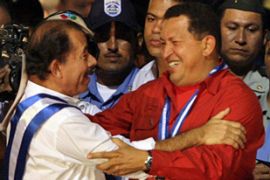Ortega back in power in Nicaragua
Former US Cold War foe promises to fight hunger, poverty and corruption.

The Sandinista leader won a presidential election in November on promises to fight the hunger, poverty and corruption that previous free-market governments have failed to end.
Ortega donned the blue-and-white presidential sash in a square in the capital and raised his fist victoriously in the air along with Chavez and Evo Morales, the Bolivian president.
Chavez told a cheering crowd that Ortega was an “example for all of us revolutionary soldiers in Latin America and the Caribbean who are willing to give our lives for our people’s future”.
|
“[Ortega] has changed and the world has changed” Julio Vado, a supporter of Daniel Ortega |
It is the latest twist in Ortega’s story, who overthrew a dictator in 1979, led his country through war and a US blockade in the 1980s, was defeated in a 1990 election and was accused of sexually abusing a stepdaughter.
Ortega has dropped many radical economic policies, saying he has learned from past mistakes, like land expropriations. He promises reconciliation and makes frequent references to God.
One supporter said: “He has changed and the world has changed.”
Julio Vado, 48, said Ortega would be more successful as a peacetime president unimpeded by the menace of the Cold War.
Ortega insists he wants good relations with the United States and met US ally Felipe Calderon, the new conservative president of Mexico, on Wednesday.
Venezuelan aid
But his main allies in Latin America are Chavez, Morales and Cuban leader Fidel Castro.
In an effort to expand his influence, Chavez has already sent cheap fuel and fertiliser to Nicaragua, the second-poorest country in the western hemisphere, and he is expected to increase aid to Ortega’s government.
While Ortega will rely heavily on Venezuelan aid, Jaime Morales, Nicaragua’s vice president, said that the new administration would not blindly follow Chavez.
Ortega first came to power in the 1979 revolution that toppled ruler Anastasio Somoza. Literacy and health care improved dramatically at first, but mismanagement and the war then plunged the country into years of economic chaos.
Memories of an authoritarian Ortega still linger.
Geraldo Lira, 28, recalled how as a young boy he saw older brothers dragged away by the army to complete obligatory service.
“He (Ortega) will have to do something good to clean his image for us to forget the 1980s.”